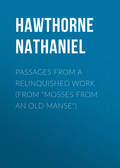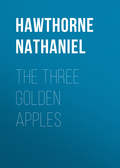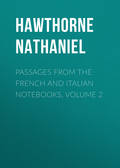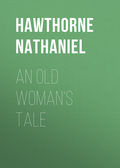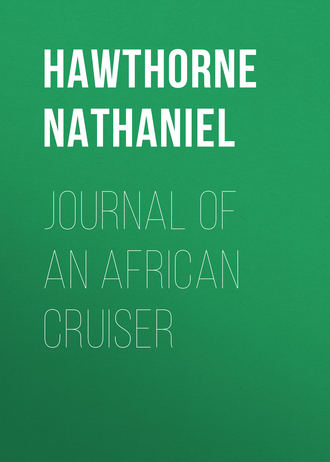
Натаниель Готорн
Journal of an African Cruiser
CHAPTER VII
High character of Governor Roberts – Suspected Slaver – Dinner on shore – Facts and remarks relative to the slave trade – British philanthropy – Original cost of a slave – Anchor at Sinoe – Peculiarities and distinctive characteristics of the Fishmen and Bushmen – The King of Appollonia – Religion and morality among the natives – Influence of the women.
November 3. – Ashore, botanizing. In this region, where all the plants are strange, and many of them beautiful, it is easy work to form a collection. With a Kroo-boy to carry my book, I cut leaves and flowers as they came to hand.
4. – Governor Roberts, General Lewis, and Doctor Day, dined with us in the ward-room. The Governor is certainly no ordinary person. In every situation, as judge, ruler, and private gentleman, he sustains himself creditably, and is always unexceptionable. His deportment is dignified, quiet, and sensible. He has been tried in war as well as in peace, has seen a good share of fighting, and has invariably been cool, brave, and successful. He is a native of Virginia, and came from thence in 1828. The friends of Colonization can hardly adduce a stronger argument in favor of their enterprise, than that it has redeemed such a man as Governor Roberts from servitude, and afforded him the opportunity (which was all he needed) of displaying his high natural gifts, and applying them to the benefit of his race.
To-night we had a Kroo-dance on the forecastle. It was an uncouth and peculiar spectacle, characterized by singing, stamping, and clapping of hands, with a great display of agility. National dances might be taken as no bad standard of the comparative civilisation of different countries. A gracefully quiet dance is the latest flower of high refinement.
5. – Two vessels descried standing in; and bets were five to one that they were the Macedonian and Decatur. It proved otherwise; they were a British gun-brig and French merchant-schooner.
8. – It has been raining for three days, almost incessantly. No Macedonian yet.
10. – Dined on shore. Our captain and five officers, the master and surgeon of an English merchantman, and the captain of the French schooner, were of the party. It was a pleasant dinner. The conversation turned principally upon the trade and customs of the coast. The slave-trade was freely discussed; and the subject had a peculiar interest, under the circumstances, because this identical Frenchman, at table with us, is suspected to have some connection with it. It is merely a surmise. The French captain speaks a little English; but, after dinner, as a matter of courtesy, we all adopted his native language. Our friend Colonel Hicks, as usual, did most of the talking; he is as shrewd, agreeable, and instructive a companion, as may often be met with in any society.
The dinner-conversation, above alluded to, suggests some remarks in reference to the slave-trade. There is great discrepancy in the various estimates as to the number of slaves annually exported from Africa. Some authorities rate it as high as half a million. Captain Bosanquet, R.N., estimates that fifteen thousand are annually sent to the West Indies, and a greater number to Arabia, all of which are from Portuguese settlements. He affirms that the trade has increased very much between the years 1832 and 1839, and particularly in the latter part of that period; an effect naturally consequent upon the great number of captures made by the English cruisers. A trader, for instance, contracting to introduce a given number of slaves into Cuba, must purchase more on the coast to make up for those lost by capture. Captain Brodhead, another British officer, says that the number of slaves carried off is grossly exaggerated, and that the English papers told of thousands being shipped from a port, where he lay at anchor during the period indicated, and for fifty days before and afterwards; in all which time, not a slave vessel came in sight. Doctor Madden states, that, during his residence in Cuba, the number of slaves annually imported was twenty-five thousand. Sir Thomas Fowell Buxton calls it one hundred and fifteen thousand! Her Majesty's Commissioners say that the number is as well known as any other statistical point, and that it does not exceed fifteen thousand. The slave-trade rose to a great height in 1836, owing principally to the high price of colonial produce. I was in Cuba in that year, and witnessed the great activity that prevailed in buying negroes, and forming plantations, especially those of sugar. The prices have since fallen, and the slave-trade decreased, on the plain principle of political economy, that the demand regulates the supply.
The English cruisers are doubtless very active in the pursuit of vessels engaged in this traffic. The approbation of government and the public (to say nothing of £5 head-money for every slave recaptured, and the increased chance of promotion to vacancies caused by death) is a strong inducement to vigilance. But, however benevolent may be the motives that influence the action of Great Britain, in reference to the slave-trade, there is the grossest cruelty and injustice in carrying out her views. Attempts are now being made to transport the rescued slaves in great numbers to the British West India islands, at the expense of government. It is boldly recommended, by men of high standing in England, to carry them all thither at once. The effect of such a measure, gloss it over as you may, would be to increase the black labor of the British islands, by just so much as is deducted from the number of slaves, intended for the Spanish or Brazilian possessions. "The sure cure for the slave-trade" says Mr. Laird, "is in our own hands. It lies in producing cheaper commodities by free labor, in our own colonies." And, to accomplish this desirable end, England will seize upon the liberated Africans and land them in her West India islands, with the alternative of adding their toil to the amount of her colonial labor, or of perishing by starvation. How much better will their condition be, as apprentices in Trinidad or Jamaica, than as slaves in Cuba? Infinitely more wretched! English philanthropy cuts a very suspicious figure, when, not content with neglecting the welfare of those whom she undertakes to protect, she thus attempts to made them subservient to national aggrandizement. The fate of the rescued slaves is scarcely better than that of the crews of the captured slave-vessels. The latter are landed on the nearest point of the African coast, where death by starvation or fever almost certainly awaits them.
I am desirous to put the best construction possible on the conduct as well of nations as of individuals, and never to entertain that cold scepticism which explains away all generosity and philanthropy on motives of selfish policy. But it is difficult to give unlimited faith to the ardent and disinterested desire professed by England, to put a period to the slave-trade. If sincere, why does she not, as she readily might, induce Spain, Portugal, and Brazil, to declare the traffic piratical? And again, why is not her own strength so directed as to give the trade a death-blow at once? There are but two places between Sierra Leone and Accra, a distance of one thousand miles, whence slaves are exported. One is Gallinas; the other New Sesters. The English keep a cruiser off each of these rivers. Slavers run in, take their cargoes of human flesh and blood, and push off. If the cruiser can capture the vessels, the captors receive £5 per head for the slaves on board, and the government has more "emigrants" for its West India possessions. Now, were the cruisers to anchor at the mouths of these two rivers, the slavers would be prevented from putting to sea with their cargoes, and the trade at those places be inevitably stopped. But, in this case, where would be the head-money and the emigrants?
It has been asserted that the colonists of Liberia favor the slave-trade. This is not true. The only places where the traffic is carried on, north of the line, are in the neighborhood of the most powerful English settlements on the whole coast; while even British authority does not pretend that the vicinity of the American colonies is polluted by it. Individuals among the colonists, unprincipled men, may, in a very few instances, from love of gain, have given assistance to slavers, by supplying goods or provisions at high prices. But this must have been done secretly, or the law would have taken hold of them. Slavers, no doubt, have often watered at Monrovia, but never when their character was known. On the other hand, the slave stations at St. Paul's river, at Bassa, and at Junk, have undeniably been broken up by the presence of the colonists. Even if destitute of sympathy for fellow-men of their own race and hue, and regardless of their deep stake in the preservation of their character, the evident fact is, that self-interest would prompt the inhabitants of Liberia to oppose the slave-trade in their vicinity. Wherever the slaver comes, he purchases large quantities of rice at extravagant rates, thus curtailing the supply to the colonist, and enhancing the price. Moreover, the natives, always preferring the excitement of war to the labors of peace, neglect the culture of the earth, and have no camwood nor palm-oil to offer to the honest trader, who consequently finds neither buyers nor sellers among them.
The truth is, the slave-traders can dispense with assistance from the Liberian colonists. They procure goods, and everything necessary to their trade, at Sierra Leone, or from any English or American vessel on the coast. If the merchantmen find a good market for their cargoes, they are satisfied, whatever be the character of their customers. This is well understood and openly avowed here. The English have no right to taunt the Americans, nor to claim higher integrity on their own part. They lend precisely the same indirect aid to the traffic that the Americans do, and furnish everything except vessels, which likewise they would supply, if they could build them. It is the policy of the English ship-masters on the coast to represent the Americans as engaged in the slave-trade; for if, by such accusations, they can induce British or American men-of-war to detain and examine the fair trader, they thus rid themselves of troublesome rivals.
The natives are generally favorable to the slave-trade. It brings them many comforts and luxuries, which the legitimate trade does not supply. Their argument is, that "if a man goes into the Bush and buys camwood, he must pay another to bring it to the beach. But if he buy a slave, this latter commodity will not only walk, but bring a load of camwood on his back." All slaves exported are Bushmen, many of whom are brought from two or three hundred miles in the interior. The Fishmen and Kroomen are the agents between the slave-traders and the interior tribes. They will not permit the latter to become acquainted with the white men, lest their own agency and its profits should cease. A slave, once sold, seldom returns to his home.
If transported to a foreign country, his case is of course hopeless; and even if recaptured on the coast, his return is almost impossible. His home, probably, is far distant from the sea. It can only be reached by traversing the territories of four or five nations, any one of whom would seize the hapless stranger, and either consign him to slavery among themselves, or send him again to a market on the coast. Hence, those recaptured by the English cruisers are either settled at Sierra Leone, or transported to some other of the colonies of Great Britain.
The price paid to the native agents for a full grown male slave, is about one musket, twelve pieces of romauls, one cutlass, a demijohn of rum, a bar of iron, a keg of powder, and ten bars of leaf-tobacco, the whole amounting to the value of thirty to thirty-five dollars. A female is sold for about a quarter less; and boys of twelve or thirteen command only a musket and two pieces of romauls. Slave-vessels go from Havana with nothing but dollars and doubloons. Other vessels go out with the above species of goods, and all others requisite for the trade. The slaver buys the goods on the coast, pays for them with specie, and lands them in payment for the slaves, money being but little used in traffic with the natives.
13. – The Decatur arrived this evening, after a passage of thirty days from Porto Praya. She left the Macedonian on the way, the winds being light, the current adverse, and the frigate sailing very badly.
17. – The Macedonian arrived.
Coming off from town, to-day, I took a canoe with a couple of Kroomen, who paddled down the river, till we arrived at a narrow part of the promontory. On touching the shallows, one of the Kroomen took me on his back to the dry land. The two then picked up the canoe, carried her across the cape, perhaps a hundred yards, and launched her, with myself on board, through the heavy surf.
21. – Sailed at daylight for Sinoe, leaving the Macedonian and Decatur, an American ship and barque, an English brig, and two Hamburg vessels, at anchor.
25. – Anchored at Sinoe at noon.
26. – Ashore. Visited Fishtown, a well-built native village, containing probably four hundred inhabitants. It is within about two hundred yards of the colonial dwellings. The people are said to have committed many depredations upon the colonists; and there is an evident intention of driving them off. This is the tribe with which we are to hold a palaver.
There are two grand divisions of native Africans on the Western Coast, the Fishmen and the Bushmen; the latter being inhabitants of the interior; and the former comprising all the tribes along the sea-shore, who gain a subsistence by fishing, trading between the Bushmen and foreign vessels, and laboring on shipboard. The Kroomen, so often mentioned, are in some respects a distinct and separate people; although a large proportion, probably nine-tenths of those bearing that name, are identical with the Fishmen. The latter are generally treacherous and deceitful; the Kroomen are much more honest, but still are not to be trusted without reserve and discrimination.
The government of these people, and of the natives generally, is nominally monarchical, but democratic in substance. The regal office appears to be hereditary in a family, but not to descend according to our ideas of lineal succession. The power of the king is greatly circumscribed by the privilege, which every individual in the tribe possesses, of calling a palaver. If a man deems himself injured, he demands a full discussion of his rights or wrongs, in presence of the rulers and the tribe. The head-men sit in judgment, and substantial justice is generally done. There are persons, celebrated for their power and copiousness of talking, who appear as counsel in behalf of the respective parties. The more distinguished of these advocates are sometimes sent for, from a distance of two or three hundred miles, to speak at a palaver; and, in such cases, they leave all other employment, and hurry to the scene of action.
It would appear that, on other parts of the coast, or farther in the interior, the native kings possess more power and assume greater state, than those who have come under my notice. The King of Appollonia, adjoining Axim Territory, is said to be very rich and powerful. If the report of his nearest civilized neighbor, the Governor of Axim, is to be credited, this potentate's house is furnished most sumptuously in the European style. Gold cups, pitchers, and plates, are used at his table, with furniture of corresponding magnificence in all the departments of his household. He possesses vast treasures in bullion and gold dust. The Governor of Dixcove informed me, that, about four years ago, he accompanied an English expedition against Appollonia, which is still claimed by England, although their fort there has been abandoned. On their approach, the King fled, and left them masters of the place. Some of the English soldiers opened the sepulchre of the King last deceased, and took away an unknown amount of gold. Afterwards, by order of the Governor, the remainder was taken from the grave, amounting to several hundred dollars. Together with the treasure, numerous articles had been buried, such as a knife, plate, and cup, swords, guns, cloth, goods of various kinds, and, in short, every thing that the dead King had required while alive. There were also four skeletons, two of each sex, buried beneath the royal coffin. It is said that sixty victims were sacrificed on occasion of the funeral, of whom only the most distinguished were allowed, even in death, to approach their master so nearly, and act as his immediate attendants in the world of spirits. The splendor of an African funeral, on the Gold Coast, is unparalleled. It is customary for persons of wealth to smear the corpses of their friends with oil, and then to powder them with gold-dust from head to foot, so as to produce the appearance of bronzed or golden statues.
The present King of Appollonia deposited six hundred ounces of gold (about ten thousand dollars) with the Governor of Cape Coast Castle, as security for his good behavior. His cellar is well supplied with rare wines, which he offers liberally to strangers who land at his residence. All these circumstances, and this barbaric magnificence, indicate a far different condition from that of the native Kings in the vicinity of Liberia, who live simply, like their subjects, on vegetables and fish, and one of whom was proud to array himself in a cast-off garment of my own. Their wealth consists not in gold, plate, or bullion, but in crockery and earthenware. Not only the Kings, but all the rich natives, accumulate articles of this kind, until their dwellings resemble warehouses of crockery. Perhaps fifty white wash-bowls, with as many pitchers, mugs, and plates, may be seen around the room; and when these utensils become so numerous as to excite the envy of the tribe, the owners are said to bury them in the earth. In the house of King Glass (so named, I presume, from the transparency of his character), I noticed the first indications of a taste for the Fine Arts. Seventy coarse colored engravings, glazed and framed, were suspended on the wall; and, what was most curious, nearly all of them were copies of the same print, a portrait of King William the Fourth.
It is to be desired that some missionary should give an account of the degree and kind of natural religion among the native tribes. Their belief in the efficacy of sassy-wood to discover guilt or innocence, indicates a faith in an invisible Equity. Some of them, however, select the most ridiculous of animals, the monkey, as their visible symbol of the Deity; or, as appears more probable, they stand in spiritual awe of him, from an idea that the souls of the dead are again embodied in this shape. Under this impression, they pay a kind of worship to the monkey, and never kill him near a burial-place; and though, in other situations, they kill and eat him, they endeavor to propitiate his favor by respectful language, and the use of charms. Other natives, in the neighborhood of Gaboon, worship the shark, and throw slaves to him to be devoured.
On the whole, their morality is superior to their religion – at least, as between members of the same tribe – although they scarcely seem to acknowledge moral obligations in respect to strangers. Their landmarks, for instance, are held sacred among the individuals of a tribe. A father takes his son, and points out the "stake and stones" which mark the boundary between him and his neighbor. There needs no other registry. Land passes from sire to son, and is sold and bought with as undisputed and secure a title as all our deeds and formalities can establish. But, between different tribes, wars frequently arise on disputed boundary questions, and in consequence of encroachments made by either party. "Land-palavers" and "Women-palavers" are the great causes of war. Veracity seems to be the virtue most indiscriminately practised, as well towards the stranger as the brother. The natives are cautious as to the accuracy of the stories which they promulgate, and seldom make a stronger asseveration than "I tink he be true!" Yet their consciences do not shrink from the use of falsehood and artifice, where these appear expedient.
The natives are not insensible to the advantages of education. They are fond of having their children in the families of colonists, where they learn English, and the manners of civilized life, and get plenty to eat. Probably the parents hope, in this way, to endow their offspring with some of the advantages which they suppose the white man to possess over the colored race. So sensible are they of their own inferiority, that if a person looks sternly in the face of a native, when about to be attacked by him, and calls out to him loudly, the chances are ten to one that the native runs away. This effect is analogous to that which the eye of man is said to exert on the fiercest of savage beasts. The same involuntary and sad acknowledgment of a lower order of being appears in their whole intercourse with the whites. Yet such self-abasement is scarcely just; for the slave-traders, who constitute the specimens of civilized man with whom the natives have hitherto been most familiar, are by no means on a par with themselves, in a moral point of view. It is a pity to see such awful homage rendered to the mere intellect, apart from truth and goodness.
It is a redeeming trait of the native character, so far as it goes, that women are not wholly without influence in the public councils. If, when a tribe is debating the expediency of going to war, the women come beneath the council-tree, and represent the evils that will result, their opinion will have great weight, and may probably turn the scale in favor of peace. On the other hand, if the women express a wish that they were men, in order that they might go to war, the warriors declare for it at once. It is to be feared, that there is an innate fierceness even in the gentler sex, which makes them as likely to give their voices for war as for peace. It is a feminine office and privilege, on the African coast, to torture prisoners taken in war, by sticking thorns in their flesh, and in various other modes, before they are put to death. The unfortunate Captain Farwell underwent three hours of torture, at the hands of the women and children. So, likewise, did the mate of Captain Burke's vessel, at Sinoe.
The natives are very cruel in their fights, and spare neither age nor sex; they kill the women and female children, lest they should be the mothers of future warriors, and the boys, lest they should fight hereafter. If they take prisoners, it is either to torture them to death, or to sell them as slaves. The Fishmen have often evinced courage and obstinacy in war, as was the case in their assaults upon the Liberian settlers, in the heroic age of the colony, when Ashman and his associates displayed such warlike ability in defeating them. The Bushmen are as cruel as the former, but appear to be more cowardly. I have heard the Rev. Mr. Brown, himself an actor in the scene, relate the story of the fight at Heddington, in which three colonists, assisted by two women, were attacked at daybreak by five hundred natives, many of whom were armed with muskets. Zion Harris and Mr. Demery were the marksmen, while the clergyman assumed the duty of loading the guns. The natives rushed onward in so dense a crowd, that almost every bullet and buckshot of the defenders hit its man. The besieged had but six muskets, one hundred cartridges, and a few charges of powder. Their external fortifications consisted only of a slight picket-fence, which might have been thrown down in an instant. But, fortunately, when there were but three charges of powder left in the house, a shot killed Gotorap, the chief of the assailants, at whose fall the whole army fled in dismay. One of the trophies of their defeat was the kettle which they had brought for the purpose of cooking the missionaries, and holding a cannibal feast. The battle-field is poetically termed the bed of honor: but the bravest man might be excused for shrinking from a burial in his enemy's stomach! Poetry can make nothing of such a fate.
Rude and wretched as is the condition of the natives, it has been affirmed that many of the Liberian colonists have mingled with them, and preferred their savage mode of life to the habits of civilisation. Only one instance of the kind has come to my personal knowledge. We had on board, for two or three months, a party of Kroomen, among whom was one, dressed like the rest, but speaking better English. Being questioned, he said that he had learned English on board of merchant-vessels, where he had been employed for several years. We took this young man into the ward-room, where he worked for three months, associating chiefly with the Kroomen on deck, speaking their language, and perfectly resembling them in his appearance and general habits. About the time of discharging him, we discovered that he was a native of North Carolina, had resided many years in Liberia, but, being idle and vicious, had finally given up the civilized for the savage state. His real name was Elijah Park; his assumed one, William Henry.



